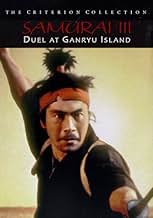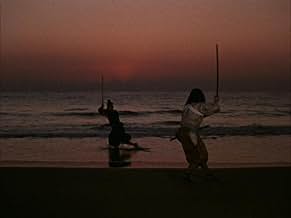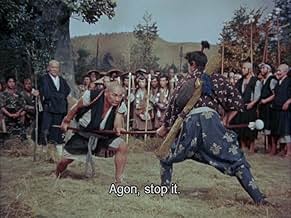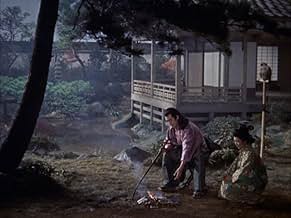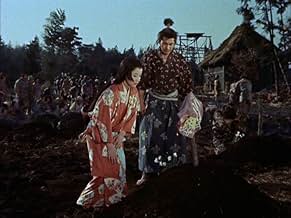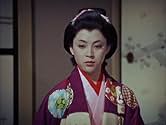O Samurai Dominante 3: Duelo na ilha Ganryu
Título original: Miyamoto Musashi kanketsu-hen: Kettô Ganryû-jima
AVALIAÇÃO DA IMDb
7,5/10
7 mil
SUA AVALIAÇÃO
Adicionar um enredo no seu idiomaMusashi Miyamoto is challenged to a duel by a confident swordsman Sasaki Kojiro. He agrees to fight him in a year's time.Musashi Miyamoto is challenged to a duel by a confident swordsman Sasaki Kojiro. He agrees to fight him in a year's time.Musashi Miyamoto is challenged to a duel by a confident swordsman Sasaki Kojiro. He agrees to fight him in a year's time.
- Direção
- Roteiristas
- Artistas
Avaliações em destaque
"In the old days, I used to hate farm work. I was always daydreaming, longing for victory and renown. I could think of nothing else. Now I'm tilling the fields again. Isn't it strange? I'm beginning to learn the value of life."
In this film's opening scene, we see Sasaki Kojiro (Koji Tsuruta) tell his lover (Michiko Saga) that he must fight Miyamoto Musashi for no other reason than the two of them are the best samurai in Japan. They're in a beautiful place with waterfalls streaming down and a rainbow arcing gracefully overhead as he calmly states his purpose, something which immediately begs the question, why? He is in an Eden of sorts, and yet feels compelled to fight an honorable man, unprovoked, to death.
Meanwhile we see the spiritual growth of Musashi (Toshiro Mifune) in the very next scene, when he's willing to humble himself and apologize for an offense the boy who's travelling with him has committed. He consistently makes decisions to avoid battle if at all possible, even if the other guy has it coming to him. We see it here, the first time when Sasaki catches up with him in a cemetery, and when he simply shows an ornery guy his fly catching prowess with his chopsticks to let him draw his own conclusions about continuing to provoke him.
The two of these great samurai (who were indeed real 17th century historical figures) are destined to fight one another, though Musashi puts Kojiro off for year, delaying the inevitable. Does director Hiroshi Inagaki effectively fill in the time it takes to get to the titular battle over the film's 105 minutes? Somewhat. There are bandits who must be fought off, and then there are the love interests. Both Otsu (Kaoru Yachigusa) and Akemi (Mariko Okada) are still carrying a torch for Musashi, and arrive in the rural area where he's taken up the simple life of farming. Personally I thought Akemi's character, the fallen woman who men have "made a plaything of," was muddled and added unnecessary melodrama. I think the film would have been stronger had she not been present, or shown instead fading into the ignominy of prostitution. Regardless, this third and last film in the trilogy suffers from some of the same problems its predecessors did, with the two women throwing themselves at his feet in what started to feel like filler until we got to the final battle (though I did like the resolution for Otsu).
The film is visually quite beautiful, with shots in a cemetery, reflections in the water, and walking past Mt. Fuji coming to mind. The poetry and precision of both lead actors striking samurai poses and movements should also be in that list, and nowhere is it done better than in their final battle, which brought the film full circle back to its beginning. There is something symbolic in this fight taking place out on the beach at sunset as the timeless waves gently roll in, oblivious to the human drama. Musashi recognizes it, and it's why he weeps. He weeps for the pointlessness of it, he weeps for mankind's insatiable urge to dominate or kill when it isn't necessary. His spiritual journey is complete, and he'll go back to Otsu and farming, not looking for trouble as he did so brashly at the beginning of the first film. He's enlightened, but how can we hope for humanity when there will always be another Kojiro?
In this film's opening scene, we see Sasaki Kojiro (Koji Tsuruta) tell his lover (Michiko Saga) that he must fight Miyamoto Musashi for no other reason than the two of them are the best samurai in Japan. They're in a beautiful place with waterfalls streaming down and a rainbow arcing gracefully overhead as he calmly states his purpose, something which immediately begs the question, why? He is in an Eden of sorts, and yet feels compelled to fight an honorable man, unprovoked, to death.
Meanwhile we see the spiritual growth of Musashi (Toshiro Mifune) in the very next scene, when he's willing to humble himself and apologize for an offense the boy who's travelling with him has committed. He consistently makes decisions to avoid battle if at all possible, even if the other guy has it coming to him. We see it here, the first time when Sasaki catches up with him in a cemetery, and when he simply shows an ornery guy his fly catching prowess with his chopsticks to let him draw his own conclusions about continuing to provoke him.
The two of these great samurai (who were indeed real 17th century historical figures) are destined to fight one another, though Musashi puts Kojiro off for year, delaying the inevitable. Does director Hiroshi Inagaki effectively fill in the time it takes to get to the titular battle over the film's 105 minutes? Somewhat. There are bandits who must be fought off, and then there are the love interests. Both Otsu (Kaoru Yachigusa) and Akemi (Mariko Okada) are still carrying a torch for Musashi, and arrive in the rural area where he's taken up the simple life of farming. Personally I thought Akemi's character, the fallen woman who men have "made a plaything of," was muddled and added unnecessary melodrama. I think the film would have been stronger had she not been present, or shown instead fading into the ignominy of prostitution. Regardless, this third and last film in the trilogy suffers from some of the same problems its predecessors did, with the two women throwing themselves at his feet in what started to feel like filler until we got to the final battle (though I did like the resolution for Otsu).
The film is visually quite beautiful, with shots in a cemetery, reflections in the water, and walking past Mt. Fuji coming to mind. The poetry and precision of both lead actors striking samurai poses and movements should also be in that list, and nowhere is it done better than in their final battle, which brought the film full circle back to its beginning. There is something symbolic in this fight taking place out on the beach at sunset as the timeless waves gently roll in, oblivious to the human drama. Musashi recognizes it, and it's why he weeps. He weeps for the pointlessness of it, he weeps for mankind's insatiable urge to dominate or kill when it isn't necessary. His spiritual journey is complete, and he'll go back to Otsu and farming, not looking for trouble as he did so brashly at the beginning of the first film. He's enlightened, but how can we hope for humanity when there will always be another Kojiro?
I feel very confident and content once I finished watching the trilogy. What starts of a nothing end on greatness. Lots of things have been said in the movie about the humans, the way they live, they behave, they treat others and above all their desires grooved in the very depth of the heart. What is most likable is the mildness with which things are being said but every bit needs to be heard with full attention. After watching the trilogy I read the book written by Miyamoto (A book of five rings Must read) himself and got an inside more clearly.
Now the movies, all three are gems without a second thought. The acting, cinematography and above all the direction is very good. Emphasis on little things, shades of lights (sun is setting etc) and even water (streams, rivers) everything is perfectly matched with the movie to the core. Above all is the way Mifune enacted the role, the way he delivers the expressions for an arrogant in the first outing, then the confused man and in the last gentle, kind and wise person is extremely believable and I have no doubt in saying that I can't imagine someone else in the role.
A must watch trilogy.
8.5/10 (all three movies)
Now the movies, all three are gems without a second thought. The acting, cinematography and above all the direction is very good. Emphasis on little things, shades of lights (sun is setting etc) and even water (streams, rivers) everything is perfectly matched with the movie to the core. Above all is the way Mifune enacted the role, the way he delivers the expressions for an arrogant in the first outing, then the confused man and in the last gentle, kind and wise person is extremely believable and I have no doubt in saying that I can't imagine someone else in the role.
A must watch trilogy.
8.5/10 (all three movies)
This is the 3rd and last episode of the "Miyamoto Musashi" or also called "Samourai" trilogy, from director Inagaki with famous Japanese actor Toshiro Mifune. The 1st episode having won the 1956 Oscar award of best foreign movie ! Inagaki's directing is refined and perfect, scenery is beautiful especially the sunset duel, choreography of combats is marvellous. Inagaki's directing and Mifune's great acting bring life to Musashi's legend and depict him with a lot of humanity.
This episode has the most significance for Japanese with the famous combat between Miyamoto Mifune, invincible samourai of more than 60 duels armed with a wooden sword, and Sasaki Kojiro, most formidable adversary and skillful swordsman armed with an extremely long sword, on the beach of Ganryu Island at sunset. The trilogy shows the life of Japan's most famous samourai and one of it's main philosopher, with the "Gorin-no-sho" treaty of 5 rings, with his sword techniques and Budhism life philosophy. In summary, the 1st episode is how he becomes an adult man, the 2nd how he becomes an invincible swordsman and the 3rd how he becomes a legend. Subplots being his relationship with Otsu who sacrifices her life for Musashi.
This trilogy is among Japan's two samourai masterpieces with Kurosawa's "Seven Samurais", mainly because of the directing/acting and Musashi's aura. Other Must-see Sword movies are recent movie Gohatto (or Tabou, 1999), Kurosawa's "Ame agaru" (After the rain, 1999), "Yojimbo" (The bodyguard) and "Sugata Sanshiro" (The Judo saga).
This episode has the most significance for Japanese with the famous combat between Miyamoto Mifune, invincible samourai of more than 60 duels armed with a wooden sword, and Sasaki Kojiro, most formidable adversary and skillful swordsman armed with an extremely long sword, on the beach of Ganryu Island at sunset. The trilogy shows the life of Japan's most famous samourai and one of it's main philosopher, with the "Gorin-no-sho" treaty of 5 rings, with his sword techniques and Budhism life philosophy. In summary, the 1st episode is how he becomes an adult man, the 2nd how he becomes an invincible swordsman and the 3rd how he becomes a legend. Subplots being his relationship with Otsu who sacrifices her life for Musashi.
This trilogy is among Japan's two samourai masterpieces with Kurosawa's "Seven Samurais", mainly because of the directing/acting and Musashi's aura. Other Must-see Sword movies are recent movie Gohatto (or Tabou, 1999), Kurosawa's "Ame agaru" (After the rain, 1999), "Yojimbo" (The bodyguard) and "Sugata Sanshiro" (The Judo saga).
Samurai III boasts far superior color and composition to the first installment. The opener includes a beautiful scene of Kojiro and Akemi by a magnificent waterfall. This sets the stylistically polished tone of the film, a nice attempt to revive our interest in the sometimes-stalling narrative (Will Kojiro fight the indestructible Musashi? Is Otsu going to get her man after spurning his inviting advances?)
In terms of eye candy, this finale gives the most exotic colors (some may complain as "un-Japanese"), the best lighting, and the most skin of Mifune's Musashi! The story continues with the intellectual and spiritual education of Musashi. Even though the final duel is set up to be his moment of self-realisation, it is preceded by a tad-curious sequence of Musashi's farmlife. Very reminiscent of the samurai-villager relationship in Seven Samurai, Musashi becomes their protector against bandits. The result is formulaic but does what the story intends: return Musashi to a life of the earth - a humanist existence preached by his Buddhist education - and to his humble origin.
P.S. Although Miyamoto Musashi/Samurai I is crucial to understanding the rise of our hero, it probably got Best Foreign film for 1955 Academy Awards during the sudden "discovery" of Japanese films starting with Rashomon.
And if you're looking for a female figure with as much spunk as Musashi himself, note the courtesan in Samurai II. Her chastisement of Musashi, that he lacks humanly affection and thinks of women as weaklings, almost makes up for the overall iffy portrayal of "romantic heroines" in the trilogy!
In terms of eye candy, this finale gives the most exotic colors (some may complain as "un-Japanese"), the best lighting, and the most skin of Mifune's Musashi! The story continues with the intellectual and spiritual education of Musashi. Even though the final duel is set up to be his moment of self-realisation, it is preceded by a tad-curious sequence of Musashi's farmlife. Very reminiscent of the samurai-villager relationship in Seven Samurai, Musashi becomes their protector against bandits. The result is formulaic but does what the story intends: return Musashi to a life of the earth - a humanist existence preached by his Buddhist education - and to his humble origin.
P.S. Although Miyamoto Musashi/Samurai I is crucial to understanding the rise of our hero, it probably got Best Foreign film for 1955 Academy Awards during the sudden "discovery" of Japanese films starting with Rashomon.
And if you're looking for a female figure with as much spunk as Musashi himself, note the courtesan in Samurai II. Her chastisement of Musashi, that he lacks humanly affection and thinks of women as weaklings, almost makes up for the overall iffy portrayal of "romantic heroines" in the trilogy!
Samurai III: Duel on Ganryu Island is the closing film of Inagaki's Samurai trilogy, the story of Musashi Miyamoto (Mifune). It is one of the best samurai films on its own and has the advantage of having the characters' history established in the first two films of the trilogy. This film abounds in good characters: Musashi's two disciples, a young boy and a horse trader, who exchange good natured barbs and loyally support Musashi; the two women in Musashi's life, good girl Otsu and bad girl Akemi; the brigand leader and his henchman, who was formerly Akemi's stepfather; and of course, Musashi's nemesis, Kojiro Sasaki, who is outstanding in both this film and Samurai II. Kojiro is actually a more interesting character than Musashi and reminds me of Tatsuya Nakadai's performance in Sword of Doom. The climactic duel on the beach with the rising sun in the background is amazing. Side note: This film has four of Kurosawa's Seven Samurai actors: Mifune, Shimura, Kato and Chiaki. See the whole trilogy.
Você sabia?
- CuriosidadesThis film is part of the Criterion Collection, spine #16.
- Erros de gravaçãoAs the final duel is fought, the duelists have light on the sides of their bodies away from the sun - Sasaki has light on his back and Miyamoto light on his face.
- Citações
Musashi Miyamoto: Brace up, Akemi.
- ConexõesFeatured in Bye Bye Jupiter (1984)
Principais escolhas
Faça login para avaliar e ver a lista de recomendações personalizadas
- How long is Samurai III: Duel at Ganryu Island?Fornecido pela Alexa
Detalhes
- Data de lançamento
- País de origem
- Idioma
- Também conhecido como
- Samurai III: Duel at Ganryu Island
- Locações de filme
- Empresa de produção
- Consulte mais créditos da empresa na IMDbPro
- Tempo de duração
- 1 h 45 min(105 min)
- Mixagem de som
- Proporção
- 1.37 : 1
Contribua para esta página
Sugerir uma alteração ou adicionar conteúdo ausente


